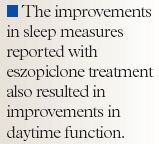- Safety & Recalls
- Regulatory Updates
- Drug Coverage
- COPD
- Cardiovascular
- Obstetrics-Gynecology & Women's Health
- Ophthalmology
- Clinical Pharmacology
- Pediatrics
- Urology
- Pharmacy
- Idiopathic Pulmonary Fibrosis
- Diabetes and Endocrinology
- Allergy, Immunology, and ENT
- Musculoskeletal/Rheumatology
- Respiratory
- Psychiatry and Behavioral Health
- Dermatology
- Oncology
From the NAMS Annual Meeting: Eszopiclone offers multiple benefits in menopausal-associated insomnia
Eszopiclone (Lunesta, Sepracor), a novel, non-benzodiazepine sleep aid, shows significant value in the treatment of insomnia associated with menopause, said Claudio N. Soares, MD, PhD, at the North American Menopause Society's 16th annual meeting in San Diego, Calif.
Eszopiclone (Lunesta, Sepracor), a novel, non-benzodiazepine sleep aid, shows significant value in the treatment of insomnia associated with menopause, said Claudio N. Soares, MD, PhD, at the North American Menopause Society's 16th annual meeting in San Diego, Calif.

Because peri-menopausal and menopausal women have more sleep complaints than younger women, a double-blind, placebo-controlled study was conducted to evaluate the efficacy of eszopiclone in the treatment of menopause- associated insomnia. Peri-menopausal and menopausal women aged 40 to 60 years, screened for major psychiatric diagnoses, who met STRAW (Stages of Reproductive Aging Workshop) stages –2 (early menopausal transition), –1 (late menopausal transition), or +1a (early post-menopause), reported sleep latency of 30 minutes or more; and had 6 or fewer hours of total sleep time, were enrolled in the study. A total of 410 peri-menopausal and menopausal women who met these criteria were randomized to either oral eszopiclone 3 mg (n=201) or placebo (n=209) once nightly for 4 weeks. From the initial group, 359 women completed the study period, 182 on the placebo and 177 on the active treatment.
Eszopiclone did not affect the frequency or duration of daytime hot flashes, and there was no significant difference between either actively treated women or those on placebo with respect to the severity of hot flashes, whether daytime or nighttime. There was, however, a significant decrease in the number of awakenings due to hot flashes in the eszopiclone-treated women compared with those receiving placebo.
The improvements in sleep measures reported with eszopiclone treatment also resulted in improvements in daytime function. Measurements using symptoms, depression, and quality of life scales combined to show significant improvements in mood, quality of life, and disability.
